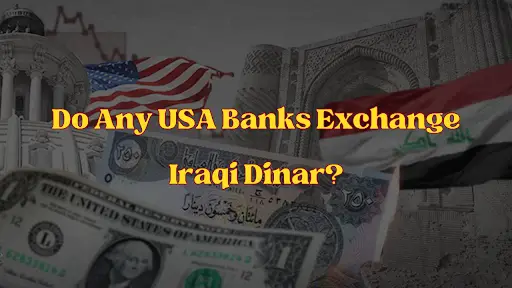Imagine holding a handful of Iraqi dinars, hoping to exchange them for U.S. dollars at your local bank. You walk into a major bank, expecting a quick transaction, only to be told that they don’t deal with Iraqi currency. This is a common experience for many people looking to exchange dinars in the U.S. But why is it so difficult?
Let’s explore the reasons behind this challenge and the alternative options available.
Why Most Major US Banks Do Not Exchange Iraqi Dinar
- Regulatory Challenges: One of the main reasons U.S. banks avoid dealing with Iraqi dinars is the strict financial regulations in place. Banks must adhere to compliance measures that monitor transactions for money laundering, fraud, and connections to terrorist financing. Iraq remains on watchlists for financial risks, making U.S. banks hesitant to handle its currency. The complex compliance requirements deter banks from engaging in dinar exchange services.
- Lack of Demand: Unlike widely traded currencies such as the euro or British pound, the Iraqi dinar has very limited demand in the U.S. Most international banks deal in currencies that are frequently exchanged in global markets. Because the dinar is primarily used within Iraq and is not an internationally recognized reserve currency, U.S. banks see little financial incentive to support its exchange.
- Currency Stability and Risk: The Iraqi dinar is highly volatile due to the economic and political instability in Iraq. Unlike stable currencies backed by strong economies, the dinar fluctuates significantly, making it a risky asset for banks. Holding large amounts of dinar can result in financial losses if the exchange rate shifts unfavorably. To mitigate risk, banks prefer not to deal with currencies that lack global stability.
Alternative Ways to Exchange Dinar in the USA
Since most U.S. banks do not exchange dinars, individuals looking to trade the currency must turn to alternative services. Here are some options:
Specialty Currency Dealers: There are reputable currency exchange companies that specialize in buying and selling exotic currencies, including the Iraqi dinar. Some well-known dealers include:
- US First Exchange
- Treasury Vault
- SafeDinar These dealers operate under financial regulations and provide exchange services for dinar holders, although their rates may not always be favorable compared to mainstream financial institutions.
Online Platforms: Some online currency exchange services allow individuals to trade dinars. However, these platforms may not offer direct exchanges between IQD and USD. For instance, platforms like Wise (formerly TransferWise) provide exchange rate information but do not facilitate direct dinar transactions.
Currency Exchange Kiosks: In areas with a large Iraqi expatriate population, such as Michigan or California, certain currency exchange kiosks might offer dinar exchange services. These are not as widely available as dealers but may still provide a viable option.
The Role of Currency Exchange Kiosks and Specialty Dealers
- Convenience and Accessibility: Specialty dealers and kiosks provide a more accessible way to exchange dinars compared to major banks. They are designed to handle less common currencies and often have experience dealing with Iraqi dinar transactions.
- Regulated Environment: Reputable dealers operate under federal and state regulations. They must comply with anti-money laundering (AML) and know-your-customer (KYC) policies, which provide security and legitimacy for transactions.
- Market Knowledge: Unlike banks that avoid dinar, these currency specialists understand its market value and trends. They can offer insights on exchange rates and the best times to trade.
Regulatory and Compliance Issues With Dinar Transactions
- Anti-Money Laundering (AML) Regulations: The U.S. Treasury Department’s Financial Crimes Enforcement Network (FinCEN) requires financial institutions to track and report suspicious transactions. Due to Iraq’s history of financial instability, dinar transactions are scrutinized to prevent illegal activities.
- Know-Your-Customer (KYC) Requirements: Legitimate exchange services must verify the identity of their clients to ensure compliance with financial laws. This process involves providing personal identification, transaction history, and proof of legal currency acquisition.
- Sanctions Compliance: While Iraq itself is not under direct U.S. sanctions, neighboring countries and organizations within the region face restrictions. Transactions involving large amounts of dinars may require additional verification to ensure compliance with U.S. laws.
How to Check If a Bank or Exchange Service Is Legitimate
- Federal Registration: Before engaging with any currency exchange service, verify whether it is registered with FinCEN or other financial authorities. Licensed services will comply with U.S. financial laws, ensuring safer transactions.
- Customer Reviews and Ratings: Look up online reviews and customer testimonials about the exchange service. Websites like Trustpilot and Better Business Bureau (BBB) can provide insights into a company’s reputation.
- Transparency in Fees and Rates: Avoid exchange services that do not disclose their fees or offer unrealistic exchange rates. A lack of transparency is often a red flag for scams or hidden costs.
- Physical Presence and Contact Information: Legitimate currency dealers will have a physical address, a contact number, and a functional customer service team. Scammers often operate anonymously and provide little or no customer support.
Final Thoughts:
While most U.S. banks do not exchange Iraqi dinars, alternative options such as specialty currency dealers and online platforms exist. However, the dinar remains a highly speculative currency with significant risks.
If you’re considering an exchange, ensure that you work with a reputable, licensed service to avoid fraud or financial loss. Ultimately, exchanging Iraqi dinars in the U.S. is possible but requires thorough research and careful decision-making to ensure a safe and legal transaction.
But remember, due diligence is key—stay informed, verify legitimacy, and never risk more than you can afford to lose.

